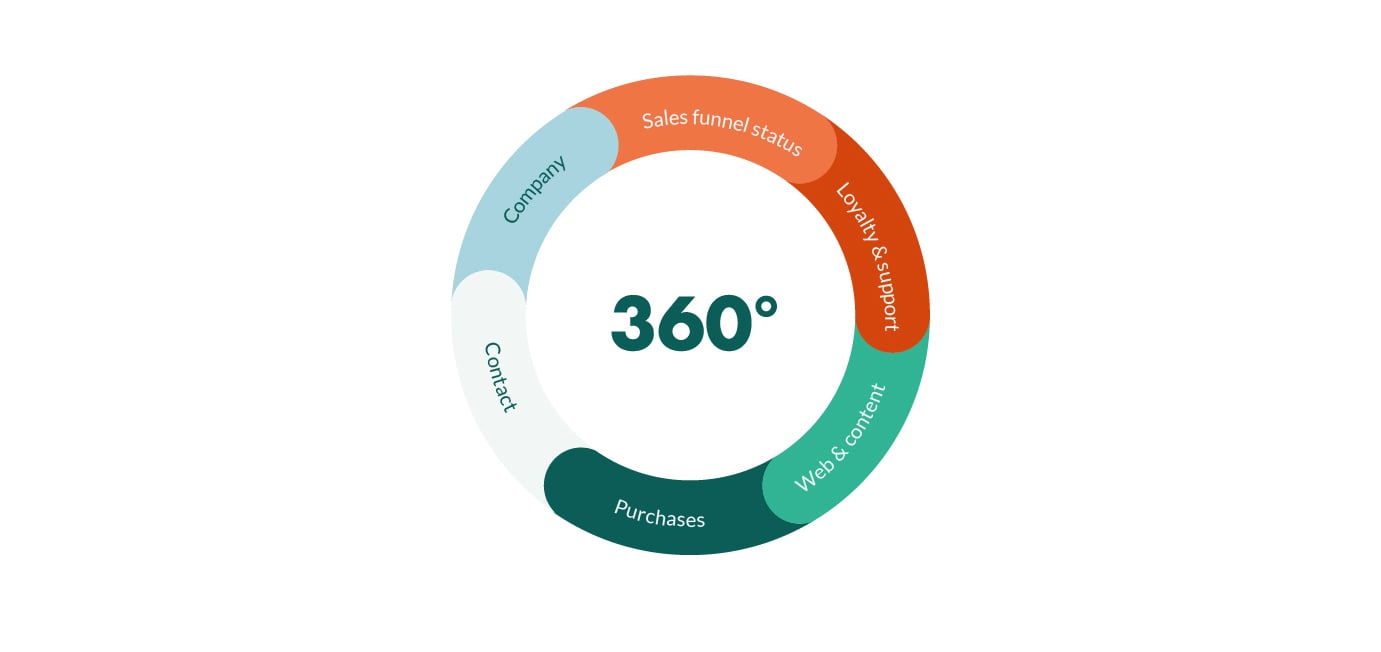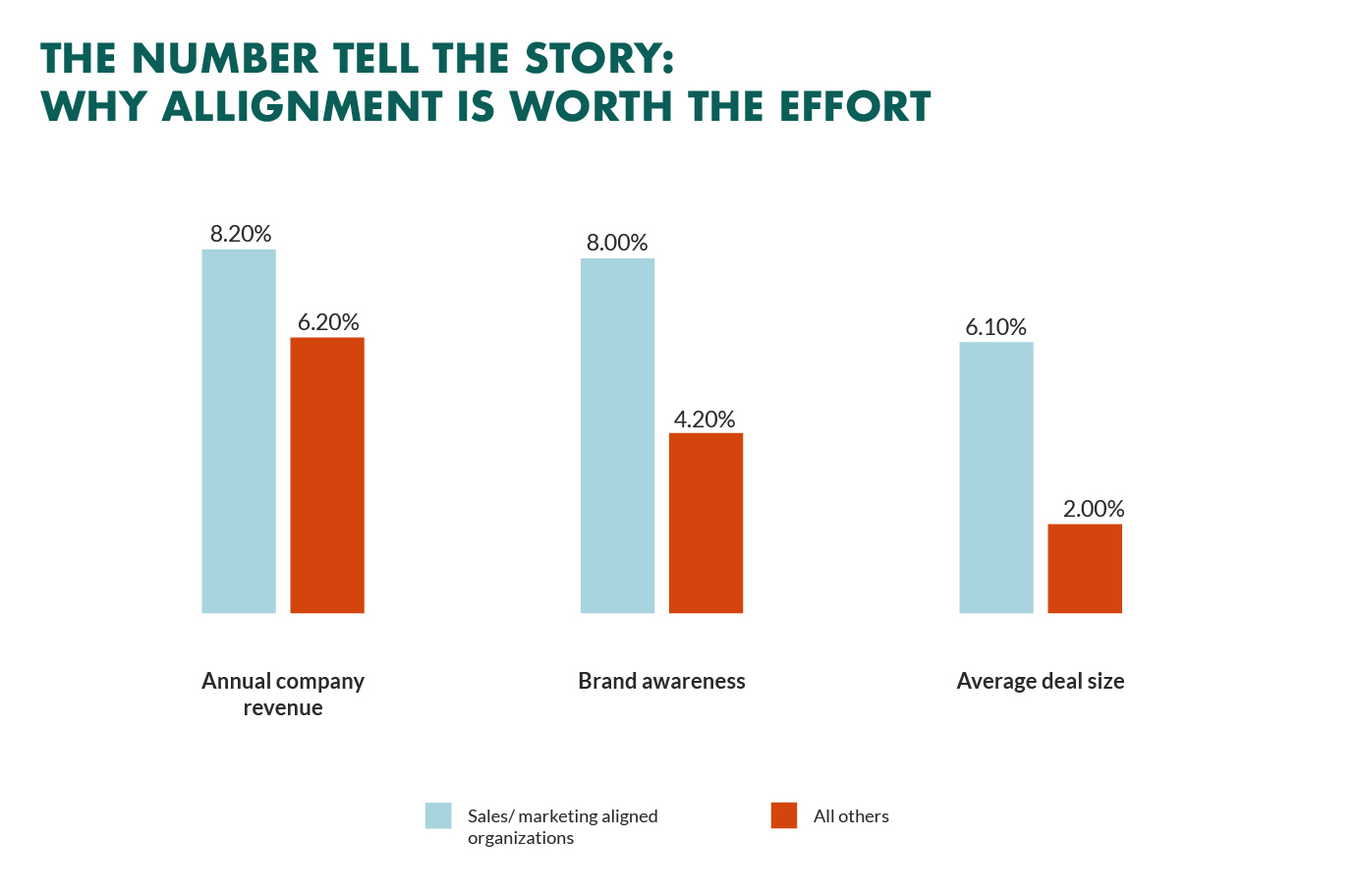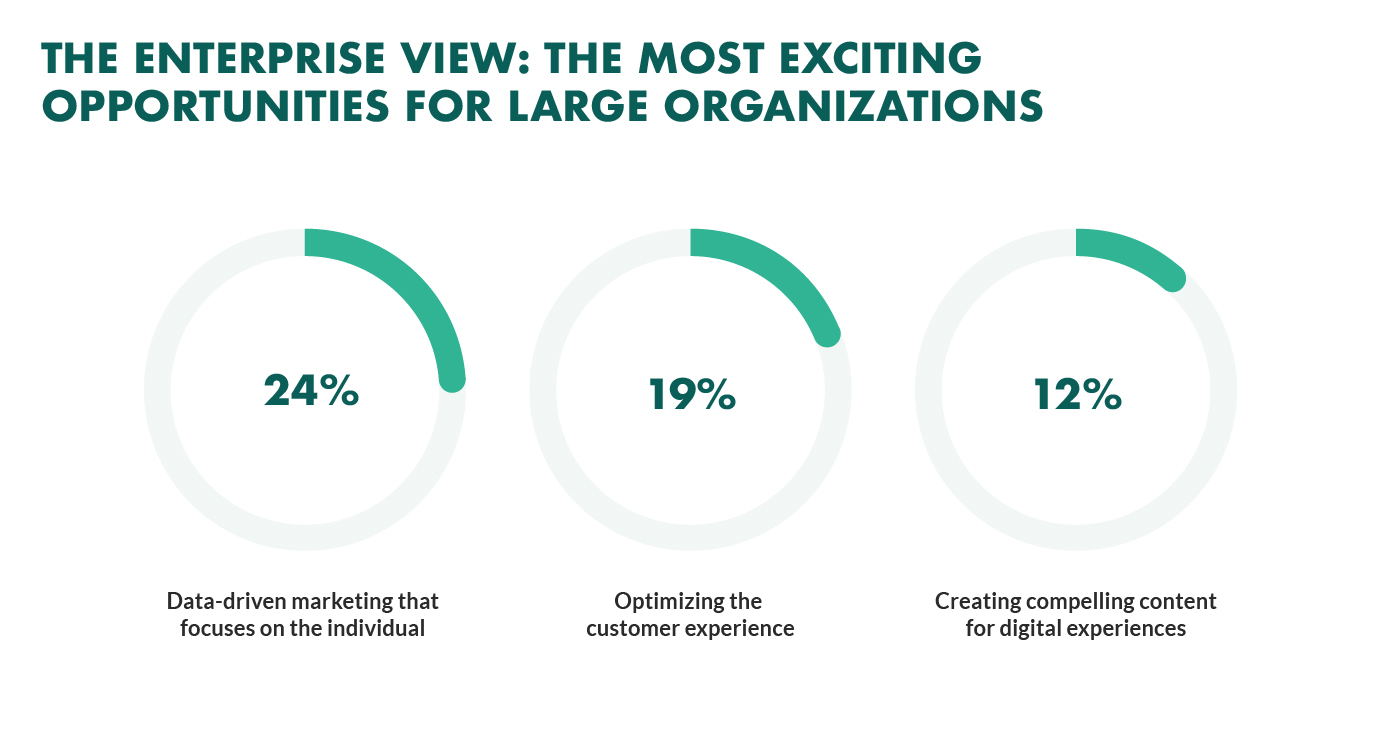Post summary:
- One of the biggest challenges for any B2B company is tracking an individuals journey across multiple channels, devices, purchases and interactions together - which often leads to a disjointed and inconsistent customer experience.
- A 360-degree customer view is a collection of all of your customer's data in one place. Usually stored in a CRM system, you can track all customer touchpoints into a single, digital profile.
- Less than 10% of companies understand how to use a 360-degree view for growth. Here, we share four tried-and-tested ways to use it for your business and how it can positively impact the customer experience.
As individuals our digital footprints are growing infinitely.
As businesses, we face increasingly more sophisticated and digitally savvy buyers.
While this may create challenges, it also creates some great opportunities.
The reality is that as this digital trail grows, for those who are capable of following and capturing it, a pool of invaluable data about the customer and their journey will present itself.
This data will allow you to not only better understand the people you’re serving and help you deliver better customer experiences, but also set yourself up for long-term success and business growth.
And for that – you need a 360-degree view of the customer!
What is a 360-degree view?
A 360-degree view of a customer is a collection of all your customer data in one place. From the basic contact information on customers, to all their past and present purchasing data and all interactions with customer service, as well as their social media behavior.
360 degrees is a relationship cycle that consists of many touchpoints where a customer meets the brand. Be it through purchases or marketing communications, via customer service or on social media.

Today, having a great product isn’t enough. You need great customer service to match. That’s why being able to access all the customer service-related interactions, such as requests, complaints, enquiries, etc. is paramount in getting a fully comprehensive view of a customer.
Your customers’ behavior on social media is an indicator of their day-to-day interactions with and reactions to your brand. Pay attention to social media channels to find out whether your customers talk about you online. Do they follow your branded profiles? Are they actively engaging with your posts? Do they leave comments or ask questions?
If you, as a company, are present at and collect information on each stop in this 360-degrees relationship cycle, then you truly know your customers. It helps you better understand your customers’ priorities and preferences. Which, in turn, means you can position yourself to better predict their current and future needs.
4 ways a 360-degree customer view can help your business grow
According to Gartner, less than 10% of companies have a 360-degree view of their customers, and only 5% are able to use a 360-degree view to systemically grow their businesses.
Here are four ways to use 360-degree view to grow your business.
1. Enhanced customer intelligence
Having a 360-degree view of your customer will help you drive a more successful customer management strategy.
Too often, what is termed as “recency bias” can influence how we deal with a customer. This means that we tend to rely on our latest conversation with a customer to direct how we handle them going forward. But the last conversation does not provide us with a complete picture of their relationship with us, and so it’s easy to hypothetically go down the wrong path, or, worse still, miss out on potential sales opportunities.
But customer relationships aren’t just about sales. Customer service is a big part of the customer journey. When customer information is stored in silos and systems are disconnected, it becomes harder to provide a really good customer service.
A survey carried out by Forrester Research in 2018, found that 42% of surveyed service agents, said they were unable to efficiently resolve customer issues due to lack of easily accessible and complete customer information. Meanwhile, 45% of customers cited lack of prompt support as the primary reason for why they will abandon a transaction.
The best CRM software ensures you track all the touchpoints a customer has with your company. By ensuring all communication, all historical purchases, and all customer service enquires are stored in one place, you will always have a holistic view of the customer.
So, if for example you have a service enquiry, your service agent can see if there are any pending activities, such as a big sales pitch or an overdue invoice. Since all the interaction history is in one place, this provides context to the query and will allow the agent to provide every customer with a more relevant and personalized response.
Further, by making sure every person in your business is getting their information from the same source, your customer communication will be consistent across multiple channels and departments. This will provide for a greater customer experience, which in turn will work towards boosting customer loyalty and reducing customer churn.
2. Better collaboration and cross-department campaigns
Another great benefit of the 360-degree customer view is that it allows better cross-departmental collaboration, most notably that between sales, marketing and service.
Sharing the same customer view, through a shared CRM means that these departments are able to easily pass important information to each other.
For example, if an up-sell or cross-sell opportunity presents itself through a service ticket, the service agent can easily see who the account manager is and notify them.
Or maybe a sales rep is heading for a big pitching meeting with a customer. Being able to see that the same customer has raised some issues recently through customer service, will make sure they arrive better prepared.
On a higher level, sales and marketing teams can build more strategic campaigns by being data-driven and using existing data to underlie their decisions. One example is joining forces to retarget cold or dead leads.
For example, the sales and marketing teams at DiscoverOrg, a B2B sales intelligence platform, identified cold or stalled opportunities together.
These leads then received extra “account-based marketing” type attention from the marketing team. They were put into a nurture email campaign, served display ads, and targeted with direct mail before the sales teams then started calling again. This new approach boosted DiscoverOrg’s conversion rate by 80%.
Moreover, a recent report by Aberdeen Group, CMO’s Agenda, found that by successfully aligning sales and marketing, you can:
- Generate 32% higher revenue
- Retain 36% more customers
- Achieve 38% higher win rates
The research also found that closer alignment generates higher brand awareness and increases the average deal size.

3. Superior predictive analysis
A 360-degree customer view will not only help you see what your customers have done, but it will also help you figure out where they might be going next.
By ensuring that you log all your customer data into one place, you can then use this data to drive better forecasts and make more reliable predictive analytics.
When you take the complete picture of the customer’s situation — all their accounts, transactions, service calls, priorities and preferences illustrated through social media platforms — this will allow you to be able to better predict where they’re heading and what they will likely need in the future.
This will not only mean your sales reps will be better positioned to foresee and act on opportunities for cross-sells, upgrades or re-ordering, but the data will give insights into where you may need to change or adapt your service offerings.
And, while we’re on the subject of change, your 360-degree view can also help forecast customer behavior when you do plan a change to a product feature or timeline. Their past behavior to such changes can help you predict their future behavior.
This will allow you to anticipate and prepare, and potentially tweak your strategy to minimize any negative impact and maximize the positive.
4. Personalize and profit
In its annual Experience Index report for 2019, Digital Trends reported that large organizations, both B2B and B2C, saw data-driven marketing for the individual as the most exciting opportunity for the year.

Back in 2012, the report already pointed out that 73% of consumers preferred to do business with brands that use personal information to make their experiences more relevant.
For example, if a bank is aware that a customer has new dependents that will most likely attend university in the future, the bank can send personalized saving account offers to the customer. Or, in the same manner, the bank can provide more personalized retirement plans further down the line for the same customer.
Businesses that have a 360-degree view of their customers are then at an advantage. If you have a holistic view of your customer and have access to a complete history of their buying habits and preferences, you are more able to make suitable product recommendations.
The more in-tune you are with your customer, who they are and why they come to you, the easier it is to meaningfully engage with them, build relationships and ultimately… trust.
This, in turn, helps boost brand loyalty and reduces churn and attrition in the long run.
Conclusion
Getting new customers is important for business growth, but keeping the customers you have and seeing them coming back for more is equally (if not more) important for longer-term sustainable growth.
Timely and relevant communication is at the heart of building your customer relationships. An effective CRM solution will help you gain and maintain a 360-degree view of your customers and their journeys with your products and your organization.
Use the data to anticipate their needs and develop strategic communication plans that will always keep your business at the top of their minds.
Are you looking to implement a new CRM system? Or perhaps you're interested in switching to another CRM system?
If so, then download our CRM Buyer's Guide below to help you choose the right solution for your business.



